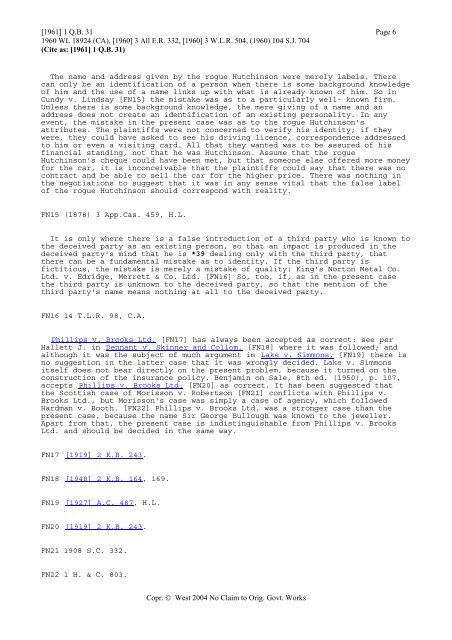Tesco v Constain - Thomson Reuters
Tesco v Constain - Thomson Reuters
Tesco v Constain - Thomson Reuters
Create successful ePaper yourself
Turn your PDF publications into a flip-book with our unique Google optimized e-Paper software.
[1961] 1 Q.B. 31 Page 61960 WL 18924 (CA), [1960] 3 All E.R. 332, [1960] 3 W.L.R. 504, (1960) 104 S.J. 704(Cite as: [1961] 1 Q.B. 31)The name and address given by the rogue Hutchinson were merely labels. Therecan only be an identification of a person when there is some background knowledgeof him and the use of a name links up with what is already known of him. So inCundy v. Lindsay [FN15] the mistake was as to a particularly well- known firm.Unless there is some background knowledge, the mere giving of a name and anaddress does not create an identification of an existing personality. In anyevent, the mistake in the present case was as to the rogue Hutchinson'sattributes. The plaintiffs were not concerned to verify his identity; if theywere, they could have asked to see his driving licence, correspondence addressedto him or even a visiting card. All that they wanted was to be assured of hisfinancial standing, not that he was Hutchinson. Assume that the rogueHutchinson's cheque could have been met, but that someone else offered more moneyfor the car, it is inconceivable that the plaintiffs could say that there was nocontract and be able to sell the car for the higher price. There was nothing inthe negotiations to suggest that it was in any sense vital that the false labelof the rogue Hutchinson should correspond with reality.FN15 (1878) 3 App.Cas. 459, H.L.It is only where there is a false introduction of a third party who is known tothe deceived party as an existing person, so that an impact is produced in thedeceived party's mind that he is *39 dealing only with the third party, thatthere can be a fundamental mistake as to identity. If the third party isfictitious, the mistake is merely a mistake of quality: King's Norton Metal Co.Ltd. v. Edridge, Merrett & Co. Ltd. [FN16] So, too, if, as in the present casethe third party is unknown to the deceived party, so that the mention of thethird party's name means nothing at all to the deceived party.FN16 14 T.L.R. 98, C.A.HPhillips v. Brooks Ltd. [FN17] has always been accepted as correct: see perHallett J. in HDennant v. Skinner and Collom, [FN18] where it was followed; andalthough it was the subject of much argument in HLake v. Simmons, [FN19] there isno suggestion in the latter case that it was wrongly decided. Lake v. Simmonsitself does not bear directly on the present problem, because it turned on theconstruction of the insurance policy. Benjamin on Sale, 8th ed. (1950), p. 107,accepts HPhillips v. Brooks Ltd. [FN20] as correct. It has been suggested thatthe Scottish case of Morisson v. Robertson [FN21] conflicts with Phillips v.Brooks Ltd., but Morisson's case was simply a case of agency, which followedHardman v. Booth. [FN22] Phillips v. Brooks Ltd. was a stronger case than thepresent case, because the name Sir George Bullough was known to the jeweller.Apart from that, the present case is indistinguishable from Phillips v. BrooksLtd. and should be decided in the same way.FN17 H[1919] 2 K.B. 243.FN18 H[1948] 2 K.B. 164, 169.FN19 H[1927] A.C. 487, H.L.FN20 H[1919] 2 K.B. 243.FN21 1908 S.C. 332.FN22 1 H. & C. 803.Copr. © West 2004 No Claim to Orig. Govt. Works
















